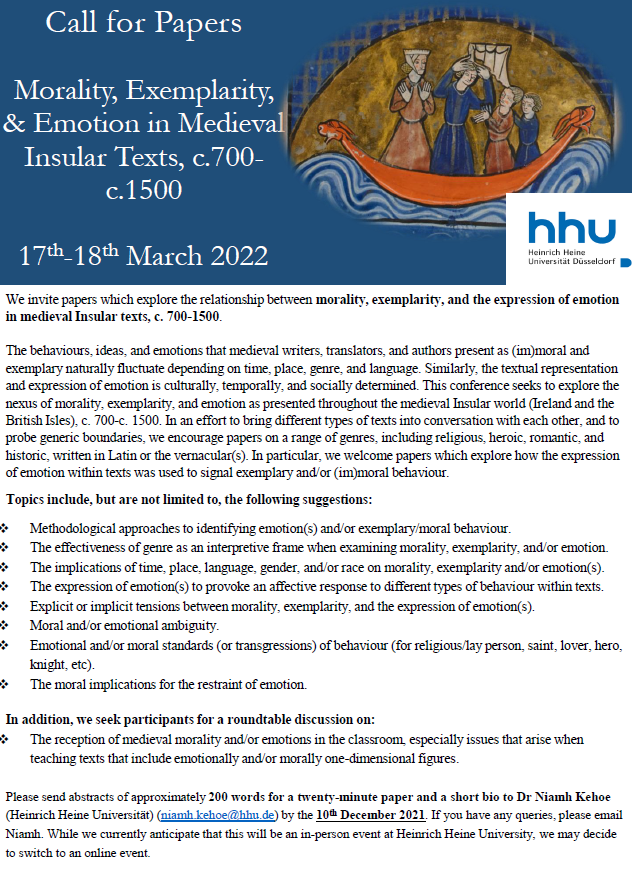A Guide to: Conferences (and how to organise them) I
by Niamh Kehoe
In my last blog entry, I discussed emotional saints in Old English hagiography (writings about the saints). I promised you all a blog post on how we might better understand such emotional saints, given that the typical model for holiness in early English hagiography appears to favour resolute, steadfast, and largely unemotional behaviour. Today is not that day. Instead, I’m going to tell you about a conference that I ran recently at HHU called, ‘Morality, Exemplarity, and Emotion in Medieval Insular Texts, c. 700-1500’. So, pour yourself some bad coffee, grab a plate of biscuits and sandwiches, and settle down as we consider: why do universities run conferences – what are they useful for? Why and how did I chose my conference themes? How do you organise a conference, anyway? What makes a good conference? What makes a bad conference? How did mine go?
Presenting at conferences can be excellent opportunities for all sorts of things: networking and socialising with other scholars in your field (those who are at the same career-stage as you, as well as more senior scholars); presenting your research to others and getting your name out there; testing research that’s perhaps more ‘in-progress’ than polished and (ideally) receiving constructive feedback on how to improve; and practising your public speaking and honing your communication skills. At times, too, conference presentations can lead to publications, and networking can to lead to future collaboration projects or even wonderful friendships. Conferences can also be advantageous for those hosting and organising them: they can raise the profile of the institution hosting them (such as HHU), and also that of the organiser(s). If the conference goes well, delegates will leave with good memories, feeling invigorated and excited about future research. This was certainly what I was aiming for with my conference!
- The best conferences are shaped around certain themes or groups of texts that speak well to each other. This makes sense: if you attend a conference where one person presents on the moon landings and the next presents on Augustine’s City of God, you’re going to struggle to make connections and wonder why you’re there. So how do you decide on a conference theme? This partly depends on what you want from a conference. For the conference I ran, I wanted to propose themes that intersected with my current research interests (ideas of morality, exemplarity, holiness, and how these changed over time) and those of my colleagues (emotions, feelings, genre, storytelling), while keeping them broad enough to be applicable to any type of medieval narrative. I settled on – as you saw above – ‘morality, exemplarity, and emotion’. Your Call for Papers (or ‘cfp’) is where you can hone these ideas further and suggest topics which people might present on. For example, I stated on mine that I was especially interested in hearing papers which explored how the expression of emotion within texts was used to signal exemplary and/or (im)moral behaviour.
Next to consider is scope: do you want to focus on a particular set of texts (for example, saints’ lives, romance or heroic texts, chronicles) or do you want to keep it broad? Similarly, do you want to restrict your conference to a particular time-period (e.g. early medieval or later medieval) or widen the scope? There are pros and cons to each and again, it depends on what you want to get from your conference and what you hope to achieve. As my research on hagiography crosses the over-stressed ‘1066’ divide, I was keen to bring scholars working across periods into conversation with each other, to share ideas and methodologies, and also to determine how ideas of morality, exemplarity, and emotion changed and evolved over time. As English texts are often discussed in isolation, I was very interested to hear from scholars working on Irish, Welsh, Scottish, Anglo-Norman, and Latin texts also – hence ‘Insular’ in the conference title. As you can tell, I was aiming for the conference to bring together a cross-section of scholars and ideas! While most papers in the end were on English texts, we did have two papers on Irish texts and some on Latin. Rather than restricting the conference to just saints’ lives (interesting for me no doubt but not for the wider Anglistik 1 community!), I encouraged abstract submissions on any type of narrative. And so, the conference title was born: ‘Morality, Exemplarity, and Emotion in Medieval Insular Texts, c. 700-1500’.
So, how did it go, I hear you asking? Stay tuned for my next blog post to find out! I’ll also discuss the practicalities of running a conference, and list some tips and tricks for ensuring things run smoothly.



